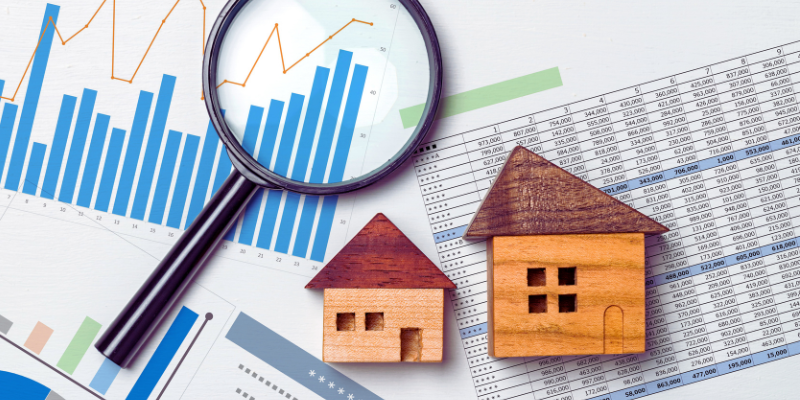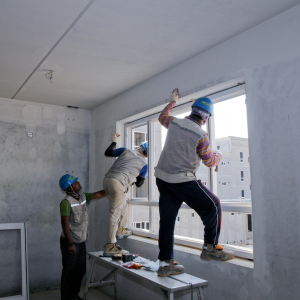
Navigating the Illinois Real Estate Market: A Guide to Appraisals
To successfully navigate the Illinois real estate market, you need to have a deep understanding of the appraisal process, especially when it comes to repairs that may lower the value of a home. Appraisals are critical in Illinois because they show how much a home is worth on the market and what fixes must be made before selling it.
Sellers need to be prepared for appraisers to evaluate not only the overall condition of the property but also specific elements that might require attention, such as structural integrity, roofing, plumbing, or electrical systems. Understanding these appraisal requirements is essential for sellers aiming to maximize their property’s appeal and ensure a smooth transaction.
In Illinois, repairs needed for an appraisal usually concern safety and habitability. Addressing these issues ahead of time can prevent the closing from being delayed and boost buyer trust. Before selling their homes, sellers should work closely with their real estate managers to look for possible red flags.
This proactive approach empowers sellers to tackle repair issues early, helping to streamline negotiations with potential buyers and increase the chances of a successful sale in Illinois’s competitive real estate market. A Team Real Estate Solutions is here to help, contact us today to get started!
Understanding Illinois Home Appraisal Requirements
For sellers in Illinois who want to make a good sale, it’s essential to know the home appraisal requirements. In buying, an appraisal is a crucial document that gives a fair opinion of a property’s market value. A licensed appraiser does it.
For sellers in Illinois, comprehending what appraisers look for can help streamline the transaction. Appraisal required repairs are significant; they are conditions identified during the appraisal that must be addressed before a mortgage lender approves financing.
Repairs like these are usually for health, safety, and building integrity. They might include fixing roof damage, plumbing issues, or electrical hazards. Ensuring these repairs are done on time can keep the closing from being pushed back. To make sure their home meets local standards and passes appraisal checks without a hitch, sellers should learn about the most common repairs asked for in Illinois.
By proactively addressing potential concerns before listing the home, sellers can enhance their chances of receiving favorable appraisals and securing buyer financing without complications. Understanding these requirements also helps sellers negotiate effectively and anticipate any necessary adjustments or concessions during sales.
Key Factors Influencing Property Appraisals in Illinois
There are a few main things in Illinois real estate that significantly affect property values, affecting both buyers and sellers. The location of a home is critical; homes in nice neighborhoods or close to good schools and other features are often worth more.
Property condition is another critical factor, as well-maintained homes with updated features tend to appraise better than those requiring extensive repairs. The size and layout of the house also play essential roles, with larger homes or those featuring modern, open floor plans typically attracting higher appraisals.
Comparable sales, or “comps,” are significant because they show how similar homes have been selling recently in the area. Appraisals can also be affected by changes in the Illinois market. For example, if demand rises in some places, prices may go up.
Economic conditions like interest rates and local employment opportunities can also sway appraisal outcomes by influencing buyer purchasing power. Understanding these factors helps sellers anticipate potential appraisal-required repairs and navigate Illinois’s real estate market more successfully.
What to Expect During an Illinois Property Appraisal Inspection

In Illinois, sellers can expect a thorough review of their home’s condition and features during a property appraisal review. Appraisers will examine the property’s structural integrity, roofing, plumbing, electrical wiring, and general safety standards.
They will also examine the exterior for necessary repairs that could impact the property’s market value. Attention is given to compliance with local building codes and regulations, as well as potential hazards such as mold or pest infestations.
The appraiser will note any obvious repairs that need to be done to meet safety standards and make the house more appealing to potential buyers. Because the appraiser will likely write down a lot of information about these finds, sellers should be ready for a list of repairs that need to be made before the sale goes through.
Understanding this process helps sellers confidently navigate the appraisal and facilitates smoother transactions within the Illinois real estate market.
Preparing Your Illinois Home for a Successful Appraisal
There are a few smart things you can do to ensure your Illinois home meets appraisal standards and gets the most money for it. First, take care of any visible repairs. Appraisers will examine the state of important parts like the roof, foundation, plumbing, and electrical systems.
Fix any leaks or building issues right away to keep your home’s value from going down. Improving the home’s curb appeal can significantly affect the appraiser’s first impression, so consider painting the outside and changing the landscaping.
Inside the home, ensure that each room is clean and well-maintained, focusing on kitchens and bathrooms where updates can yield high returns. Consider minor but impactful upgrades such as replacing outdated fixtures or adding energy-efficient appliances.
You can show that you care about maintaining the property by giving a well-organized list of recent repairs and changes, along with the receipts. Knowing the Illinois real estate market trends can also help you point out features buyers will want during the evaluation process.
By proactively addressing these elements, sellers can position their homes favorably in a competitive market and potentially increase the final appraised value.
Comprehensive Checklist for Pre-appraisal Home Improvements in Illinois
To prepare for a successful real estate appraisal in Illinois, sellers should focus on specific home improvements that can enhance the property’s value and meet appraisal standards. Start by addressing safety concerns, such as fixing faulty wiring or repairing broken stairs, to ensure the home meets basic safety requirements.
Check the roof for leaks and fix any problems with the base to keep the structure strong. Another important factor is improving energy efficiency. You might want to replace old windows with energy-efficient ones and upgrade the insulation.
Interior aesthetics also play a vital role, so refresh walls with neutral paint colors and ensure all plumbing fixtures are fully operational and leak-free. Curb appeal should not be overlooked either—maintain the landscaping, clear debris from gutters, and repair any noticeable exterior damage.
By following this thorough list of pre-appraisal home changes designed specifically for Illinois homes, sellers can significantly increase their home’s appraised value and speed up the selling process.
Essential Repairs for Passing a Property Appraisal in Illinois
When sellers in Illinois prepare their homes for appraisal, they must pay close attention to necessary repairs, which can significantly affect the assessment result. It’s essential to make sure the roof is in good shape because evaluators look closely for signs of damage or leaks.
Electrical systems should be up-to-date and free from hazards, including addressing outdated wiring or faulty outlets. Plumbing issues need prompt attention; leaky faucets, clogged drains, or dysfunctional toilets can negatively affect the property’s value.
Structural integrity is another key area; cracks in the foundation or walls must be repaired to avoid potential red flags during the appraisal process. Safety features such as smoke detectors and carbon monoxide alarms should be installed and functioning correctly, complying with Illinois state regulations.
Addressing any visible pest infestations is essential, as these can indicate underlying issues requiring extensive remediation. By focusing on these fundamental aspects, sellers can ensure their property meets the necessary standards to achieve a favorable appraisal in Illinois’s competitive real estate market.
Commonly Required Repairs During an Illinois Home Appraisal
When selling a home in Illinois, understanding the commonly required repairs during a home appraisal can significantly impact the transaction’s success. Appraisers often focus on health and safety issues, structural integrity, and building code compliance.
Sellers should pay attention to common repair areas such as roof damage, plumbing leaks, electrical system deficiencies, HVAC malfunctions, and window or door functionality. Ensuring that these aspects are in good condition can prevent closing delays.
Additionally, addressing any signs of mold or pest infestations is crucial since these can lead to significant property devaluation. In Illinois real estate transactions, appraisers also scrutinize foundational issues or water damage in basements due to the region’s weather conditions.
If sellers take care of these fixes before they put their house on the market, they can make the negotiations go more smoothly and possibly get better offers from buyers who are sure of the home’s quality and safety.
Legal Requirements for Property Repairs Before Selling in Illinois

In Illinois, people who want to sell their homes must know the legal requirements for repairs that must be made before the sale can go through. They should also know that an appraisal may show them what repairs need to be done to meet local safety and building rules.
The fixes that the appraiser orders usually involve the building’s structure, plumbing, electricity, or health risks like mold or lead-based paint. Illinois law says that sellers must tell buyers about any known major flaws in the property that could lower its value or make it less safe.
Failure to comply with these disclosure obligations can lead to legal liabilities or even derail the sale process. Additionally, mortgage lenders typically require these necessary repairs to be completed before approving buyers’ financing.
By proactively addressing and rectifying any identified deficiencies, sellers in Illinois can facilitate a smoother closing process and avoid potential disputes with buyers over undisclosed repair needs.
The Impact of Repairs on Home Value in Illinois
In the Illinois real estate market, sellers who want to get the most money for their home need to know how repairs needed for an appraisal affect the house’s value. Appraisals are a big part of figuring out how much a house is worth on the market, and any repairs that are found during the process can change the final assessment report.
Common issues such as roofing defects, electrical problems, or plumbing concerns often require attention before closing a sale, as they can dramatically affect buyer perceptions and financing options. In Illinois, lenders typically mandate that certain repairs be completed to ensure the property meets safety and habitability standards, directly influencing its appraised value.
By taking care of these fixes, sellers can avoid problems that could ruin the deal and increase their negotiating power. These repairs affect more than just the current cost; they also help the home’s value in the long run by keeping it competitive in a changing market.
Consequently, sellers who invest in addressing appraisal-required repairs facilitate smoother transactions and protect their investment’s future value in Illinois’s competitive real estate landscape.
Enhancing Home Value Through Strategic Repairs in Illinois
In Illinois real estate, enhancing home value through strategic repairs is crucial for sellers aiming to maximize their property’s market appeal and profitability. By understanding appraisal-required repairs, sellers can focus on essential upgrades significantly impacting a home’s appraised value.
Fixing structural problems, updating old systems like plumbing and electricity, and taking care of any safety risks are often important. Also, changes to the house’s appearance, like new paint, modern fixtures, and well-kept landscaping, can make it seem more valuable.
Putting these fixes at the top of the list not only helps you meet the appraisal requirements but also attracts buyers who want move-in-ready homes. Working with real estate professionals and inspectors in the area can help sellers figure out which changes will have the most impact on the Illinois market.
This plan ensures that fixes will pay off big time by making the house look better overall and more competitive in the local real estate market.
Top Renovations That Increase Appraised Value of Homes in Illinois
When selling a home in Illinois, understanding which renovations can increase the appraised value is crucial for maximizing your property’s market potential. Kitchen upgrades often provide substantial returns, as modernized kitchens with energy-efficient appliances and contemporary finishes are highly desirable to buyers.
Appraisers also give bathrooms a lot more value when they are remodeled. Updated fixtures, new tiling, and water systems that work better all get good marks from appraisers. By making a good first impression, landscaping and exterior upgrades like new paint or siding can raise the value of a home even more.
Additionally, replacing old windows with energy-efficient models improves aesthetics and reduces utility costs, appealing to environmentally conscious buyers. Adding living space through basement finishing or attic conversions can substantially boost a property’s appraisal by increasing usable square footage.
These innovative improvements align with what buyers are looking for in the Illinois real estate market and can help boost your appraisal report, making it easier to sell your house fast in Maywood.
Evaluating Cost-effective Repairs for Optimal Return on Investment in Illinois Homes
You must know what repairs the appraisal firm requires to get the most money back when you sell your Illinois house. Repairs that don’t cost much money can make the home more valuable and attract buyers.
To meet appraisal standards, sellers should focus on fixing problems with the structure, the roof, and essential systems like the water and electricity. These repairs not only ensure that the property complies with Illinois real estate laws, but they also give buyers more trust.
Making small cosmetic changes, like painting or updating equipment, can give you a lot of value for your money. Selling a home in Illinois can be more difficult, but by figuring out which fixes will make the biggest difference within their budget, sellers can make their home more appealing to buyers and ensure they can close the deal.
How to Address Repair Issues Before an Illinois Home Sale
Repair problems found during an appraisal must be handled before an Illinois home can be sold. If a seller wants to avoid problems during the appraisal process, they should first get a pre-listing check.
Some common problems, like damaged roofs, water leaks, electrical issues, or structural issues, can significantly affect the property’s value and the buyer’s decision to buy it. By making these repairs ahead of time, sellers can improve their bargaining position and maybe even raise the price of their home.
If you need repairs, hiring licensed workers will ensure that the work follows all local building codes and rules. This is especially important in Illinois, where compliance standards are very strict. Keeping receipts and records of work done can also reassure potential buyers and appraisers that the right steps were taken to fix the problem.
Taking these steps facilitates smoother transactions and helps prevent delays or renegotiations further along in the selling process.
Leveraging Professional Inspections to Anticipate Required Repairs on Illinoisan Properties
Getting professional inspections is essential for Illinois sellers who want to know what repairs their homes need for an appraisal. If sellers hire a skilled home inspector before putting their house on the market, they can find problems that might arise during the buyer’s appraisal process.
This proactive approach allows sellers to address necessary repairs in advance, increasing the property’s marketability and potentially leading to a smoother transaction. In Illinois real estate, understanding standard repair requirements—such as roof, plumbing, electrical systems, and structural integrity is essential.
Professional inspectors give sellers thorough reports that point out these problems. This lets sellers decide which repairs are most important based on how quickly they need to be done and how much they will cost. By taking care of these problems early on, buyers not only raise the value of their home but also lower the risk of delays or price changes during the sale.
This foresight is invaluable in Illinois’ competitive real estate market, where timely sales are crucial for success.
Strategies for Negotiating Repair Requests After an Initial Appraisal Report in Illinois
When navigating the complexities of repair requests following an initial appraisal report in Illinois real estate, sellers should adopt strategic negotiation techniques to protect their interests. Understanding the local market dynamics is crucial, as it empowers sellers to leverage current conditions during negotiations.
Sellers can start by reviewing the appraisal report with a keen eye for discrepancies or overestimated repair costs, which can be used to challenge buyers’ demands. Engaging a qualified real estate professional familiar with Illinois regulations provides valuable insights and strengthens the seller’s negotiating position.
Additionally, obtaining multiple quotes from licensed contractors for any requested repairs offers a basis for reasonable and cost-effective counteroffers. Sellers might also consider offering concessions, such as closing credits or price adjustments, instead of undertaking extensive maintenance.
This method saves time and makes it easier to keep track of the whole deal. Knowing the appraisal factors specific to Illinois real estate and being able to communicate clearly and be flexible are important for sellers to guide repair negotiations without losing money.
Can an Appraisal Require Repairs?
In the Illinois real estate market, understanding whether an appraisal can require repairs is crucial for sellers aiming for success. A certified appraiser’s appraisal assesses a property’s value and condition to ensure it meets the lender’s standards.
While appraisers primarily focus on valuation, they can identify necessary repairs if the property’s condition affects its marketability or safety. Common repair issues include structural defects, roofing problems, electrical hazards, and plumbing leaks.
In Illinois, these required repairs often align with guidelines set by FHA or VA loans, which are particularly stringent about property conditions. Sellers should proactively address potential issues before an appraisal to avoid delays in the transaction process.
By comprehensively understanding how appraisals interact with repair requirements in Illinois real estate transactions, sellers can enhance their property’s appeal and facilitate a smoother closing process.
What Is an Example of Required Repairs?
In the Illinois real estate market, understanding lender-required repairs is crucial for sellers aiming for a successful transaction. An example of lender-required repairs often relates to safety and habitability concerns identified during the appraisal process.
For example, before the lender accepts the buyer’s mortgage, if an appraiser finds that a property’s roof has significant damage or leaks, this could be marked as something that needs to be fixed. It’s also essential to address problems like broken electrical systems, plumbing issues, or structural flaws like foundation cracks.
Lending companies require these repairs to ensure the property meets their needs. In Illinois, this is what needs to be done to ensure the closing process goes more smoothly and the sale goes through without any delays.
By proactively addressing these common appraisal-required repairs, sellers can enhance their property’s appeal and expedite the transaction efficiently.
Should Appraisals Be Done Before or After Repairs?

When navigating the complexities of Illinois real estate, sellers often grapple with the timing of appraisals about required repairs. Understanding whether appraisals should be conducted before or after completing necessary maintenance can significantly impact a seller’s success.
Conducting an appraisal before repairs can provide sellers with a comprehensive overview of potential issues affecting the property’s valuation, allowing them to prioritize essential improvements. This approach ensures sellers address critical repairs that could deter buyers or decrease offers.
In contrast, getting an appraisal after repairs can show that the property is in better shape and has more value, which could lead to a better place on the market and a higher sale price. Strategically timing the appraisal process to coincide with the end of repairs is essential for Illinois sellers who want the best results.
By carefully considering whether to schedule appraisals pre- or post-repair, sellers can better manage their investments and maximize returns in the competitive Illinois real estate market.
What Are Improvements Considered in an Appraisal?
In the Illinois real estate market, sellers who want to get the most money for their home need to know what changes are considered in an appraisal. Appraisers consider several improvements that can significantly affect the valuation report.
Key improvements include kitchen and bathroom remodels, often yield high returns due to their importance in daily living. Upgraded flooring, such as hardwood or quality tiles, adds substantial value.
Energy-efficient upgrades, including new windows, modern HVAC systems, and enhanced insulation, are increasingly appealing to buyers looking for long-term savings on utility costs. Curb appeal improvements like landscaping, fresh exterior paint, or a new roof contribute positively by enhancing the property’s first impression.
The appraisal value also considers structural upgrades such as finished basements or additional living spaces. By strategically improving these areas before listing, Illinois home sellers can boost their home’s value and address any potential issues flagged by appraisers. At the same time, if you’re looking for a quicker, hassle-free option, we buy houses in Illinois, so no repairs or upgrades are needed.
| FHA LOANS | HUD’S | HUD | HUD HOMES | REFINANCING | REFINANCE |
| HOME LOAN | MORTGAGE LENDING | HEATER | HVAC (HEATING, VENTILATION, AND AIR CONDITIONING) | HOT WATER | WATER HEATER |
| CASH | BROKER | HOME INSPECTION | HANDRAILS | VALVE | |
| UNDERWRITER | FEE | CONTRACTING | VENTILATION | HOMEOWNER | MONEY |
| FINANCE | EQUITY | BANK | ASBESTOS | URBAN DEVELOPMENT | USDA |
| U.S. | RISK | RELIEF VALVE | PIPE | INFORMATION | HEATING |
| FNMA | FANNIE MAE | EXPERIENCE | CHICAGO, IL | CHICAGO | A CASH OFFER |
| THE PROPERTY IS |
